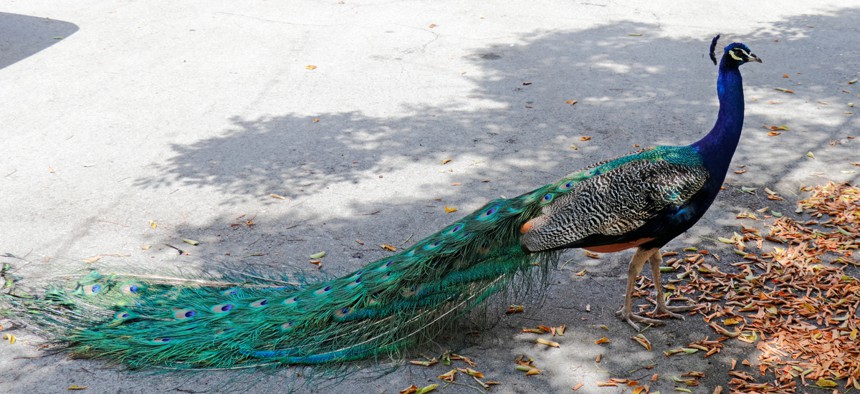Poop, Screams and Divebombing Birds: How One City Plans to Deal With a Peacock Problem

There are between 60 and 90 peacocks in the 190-home neighborhood, residents said. Shutterstock
The Miami City Commission will begin humanely trapping and relocating peacocks from one neighborhood after years of complaints from residents.
The city of Miami will begin trapping and relocating peacocks from one neighborhood after residents complained of slippery piles of poop, dive-bombing birds and screeching and squawking at all hours of the night.
“They are a pest. They are noisy. They do poop. The poop is significant. And they are getting very aggressive over time,” Pat Tzakis, a resident of Miami’s Coconut Grove neighborhood, told the City Commission at a meeting this month. “When I moved into the neighborhood 25 years ago, they were mainly confined to 17th Avenue...now we have about 100 peacocks in our own neighborhood, which is small. They’re getting aggressive as they multiply. Please help us out in finding a solution for these magnificent creatures.”
The peacocks have been a staple in Coconut Grove for years, residents said. But the population has burgeoned over time, bringing with it large pyramids of slimy poop, aggressive males (particularly during mating season) and birds that swoop down, unprovoked, with their talons outstretched. Tourists traipse through the neighborhood with cameras, trampling lawns and dropping cigarette butts.
And then there’s the cacophonous mating.
And the shrieking.
“If you've never heard their call—it almost sounds like someone is being murdered,” Tom Falco, editor of the Coconut Grove Grapevine blog, said in an email. “Last week I was driving on a quiet tree-lined side street and one called out, almost like a scream, and it took me by such surprise, I almost ran off the road.”
City commissioners have heard multiple complaints about the birds and have talked with residents about the problem for years. Commissioner Ken Russell decided to propose a humane solution to the problem in October after he learned that the birds were causing property damage in the neighborhood.
“Because of the proliferation, because they’re so aggressive during mating season, and because there are so many males, they see their reflection in cars and they scratch,” Russell said during the commission's meeting, adding that one peacock pecked and scratched the entire surface of city employee’s Toyota Prius.
“He needs a whole new paint job,” Russell said. “It’s property damage to an extent you wouldn’t believe.”
Russell’s proposal, approved unanimously, amends the city’s charter to “allow for the relocation of peafowl...in a manner that does not physically injure or harm the peafowl.” The plan is based on a similar program in Ranchos Palos Verdes, California, where the city council approved—and then extended—a measure to trap and relocate up to 150 birds.
Russell did not immediately respond to a request for comment on the details of his plan and commission members did not discuss the specifics at its meeting, leaving it unclear how many birds will be relocated, when trapping will begin or where, exactly, the peacocks will live out their days. Falco said he was not aware of any specifics, including how the city would ensure that the population does not rebound over time.
“There could be 100 or 200 nests with eggs in them this very moment,” he said. “They are just going to proliferate. I heard that they may take the females out, but that makes the males more aggressive, and probably vice versa.”
But the program may be good news for residents who pleaded with the city for a solution, including Andres Candela, a retired physician who told the commission that dealing with the peacocks has diminished his and his wife’s enjoyment of their longtime home.
“It’s about our quality of life, which has changed for all of us,” he said. “We would like to stay in our home and our neighborhood that we love in the remaining years of our lives. I don’t want to remain forgotten in a filthy peacock land as a hostage of a group of birds. I think that is more than fair.”
Kate Elizabeth Queram is a Staff Correspondent for Route Fifty and is based in Washington, D.C.
NEXT STORY: Five Years Later, HIV-Hit Town Rebounds. But The Nation Is Slow To Heed Lessons.





